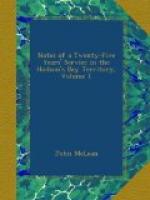The scene was interesting, as exhibiting the first rude attempts at dramatic representation of a savage people; and it served, in some measure, to efface the impression made by the somewhat disgusting spectacle previously witnessed. The affair concluded by an exchange of presents, and the party broke up.
Two young men, natives of Oregon, who had received a little education at Red River, had, on their return to their own country, introduced a sort of religion, whose groundwork seemed to be Christianity, accompanied with some of the heathen ceremonies of the natives. This religion spread with amazing rapidity all over the country. It reached Fort Alexandria, the lower post of the district, in the autumn; and was now embraced by all the Nekaslayans. The ceremonial consisted chiefly in singing and dancing. As to the doctrines of our holy religion, their minds were too gross to comprehend, and their manners too corrupt to be influenced by them. They applied to us for instruction, and our worthy chief spared no pains to give it. But, alas! it is for the most part labour in vain. Yet, an impression seemed to have been made on a few; and had there been missionaries there at the time, their efforts might have proved successful. But the influence of the “men of medicine,” who strenuously withstand a religion which exposes their delusive tricks, and consequently deprives them of their gains,—together with the dreadful depravity everywhere prevalent,—renders the conversion of the Tekallies an object most difficult to accomplish.
It is a general opinion among Christians, that there exists no nation or people on earth who are entirely ignorant of a Supreme Being. I shall contrast the language of this tribe with that of the Sauteux or Ojibbeway, and let the reader judge for himself.
I have heard a heathen Ojibbeway, when giving a feast, express himself thus: “The great Master of Life, he who sees us and whom we cannot see, having done me charity, I invite you, my brother, to partake of it.” On a like occasion, a Takelly describes the manner in which he killed his game, but never alludes to a deity. When an Ojibbeway wishes to confirm the truth of what he says beyond a doubt, he points to heaven and exclaims, “He to whom we belong hears that what I say is true.” The Takelly says, “The toad hears me.” You ask a Takelly what becomes of him after death, he replies, “My life shall be extinct, and I shall be dead.” Not an idea has he of the soul, or of a future state of rewards and punishments. The Ojibbeway answers, “After death my soul goes either to a happy land, abounding with game and every delight; or to a land of misery, where I shall suffer for ever from want. Whether it go to the good or bad place depends on my good or bad conduct here.”




